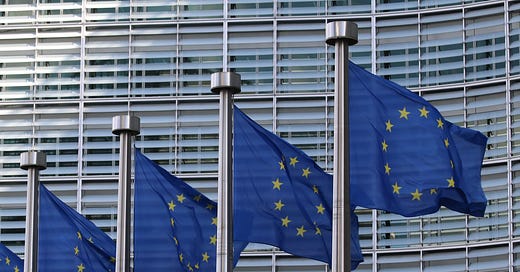July 4th, tech's international tax, and why the bitcoin selloff is my fault
Welcome back to Cautious Optimism! It’s Tuesday, July 5th, 2024. Today, we’re looking at how big tech faces greater international costs, the latest labor numbers from the United States, and the recent crypto-selloff. To work! — Alex
Number of the day: 206,000. That’s the latest jobs number in the USA, a little better than the 200,000 that was expected. Average hourly earnings rose 0.3%, and 3.9% compared to a year ago. The unemployment rate ticked up to 4.1%, however, meaning that the Fed has conflicting datapoints to weight when it comes to cutting rates.
Small Bites
Trending Up: Samsung’s financial performance … laundering oil/gas talking points … the AI/training data debate, globally … technology layoffs … Threads … letters to investors … Keir Starmer … grid-connected batteries … West Taiwan bullying Taiwan …
Trending Down: Cybersecurity … Russia’s political independence … crypto prices … American tech companies doing business in the EU … Windows … Liz Truss … Indian-Chinese border tensions …
July 4th: Instead of sending a note yesterday, I decided to condense my thoughts and share them today:
The United States as a project is easy to summarize: What if we had a place where all are welcome, where all languages are spoken, where all creeds flourish, democracy reigns, and business is free?
The project is worth supporting because it improves over time; the reason why I remain an American stan is due to our ability to become more — more kind, more fair, and more equitable, and, yes, more wealthy, over time.
What strikes me on this July 4th is how much my political foes want precisely the opposite of all that. Those are the stakes.
Big Tech’s rising international bills
This week, a group of Polish media companies protested against “changes to the copyright law that they say will favour tech giants, such as Google and Facebook, who use their content,” according to Notes From Poland (NFP). Why are the Polish media upset? They are concerned that the new law will allow foreign tech companies “use [their] content free of charge and with impunity, and transfer the profits abroad,” NFP quotes.
The Polish debate on the power of large technology companies is hardly unique. Recently, U.S.-based media-technology companies (Netflix, Disney, etc) protested a new 5% revenue tax in Canada. The levy would go to “help finance local broadcast news and other domestic content,” Morningstar reports.
But wait, there’s more! Canada is also leveling a 3% tax on “revenue from companies that provide digital services to Canadian users, or sell Canadian user data,” the WSJ reports. And that tax is retrospective to 2022.
Canada is not alone. The EU is busier than a French protest movement when it comes to investigating and fining big American tech companies. Here’s a sampling of headlines from last week or so:
Meta's pay or consent model in crosshairs for breaching EU tech rules (Reuters)
Musk’s X Risks Fine as EU Steps Up Crackdown on Big Tech (Bloomberg)
Apple accused of violating E.U.’s new tech competition rules (WaPo)
Amazon faces more EU scrutiny over recommender algorithms and ads transparency (TechCrunch)
The potential fines for the above infractions are massive, mind.
There was a time when American big tech companies could do pretty much whatever they wanted. Antitrust enforcement was loose, profits launderable through Ireland — I will never get over how shameless this was — and the global Internet an open playground. How times have changed.
One reason the United States retains so much international weight today is its economic might, which is partially predicated on the strength of its technology goliaths. The other side of that coin is that other nations and blocs are not entirely enthused to see so much of their economic activity filter through the hands of companies headquartered elsewhere. It would not shock me if this sort of business-government climate for American tech companies abroad is the new norm.
Gone are the days when Goldman was considered the hungry squid affixed to the face of the global economy. Today, tech giants are the real god-kings, while investment banks have to piddle around with market caps in the mere hundreds of billions. Instead of the trillions, like the big boys.
The crypto downturn is my fault
A few weeks back, I wrote that my family might begin putting a very small fraction of our taxable savings into a bitcoin ETF, just in case the coiners are right and those of us who save in traditional equities are wrong. I finally got around to doing this — disclosure alert! — and then the price of digital assets promptly tanked. You are welcome.
Jokes aside, the current selloff in the value of bitcoin is notable because it comes after two events that were supposed to support its price came and went; so much for the halving and inflows from ETFs changing the narrative, I suppose. At least for now.
What will be interesting to see is how the recent boomlet in venture funding for crypto companies deals with a decline in digital asset prices, a key indicator for trading activity, and consumer interest to boot.
Tomorrow in Cautious Optimism: An interview with the CEO of Beehiiv. Make sure that you I have your email so that I can send it to you. — Alex



